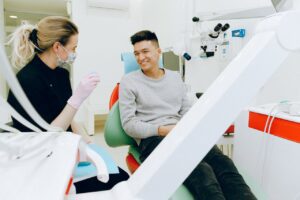Do you suffer from sleep apnea? Does your partner’s sleep apnea keep you up at night? You’re not the only one losing sleep, as 22 million Americans also suffer from the effects of sleep apnea.
Sleep apnea causes people to stop and start breathing repeatedly, snore loudly, and feel exhausted in the morning. You also won’t function as well while you’re doing your day-to-day tasks.
If you’re looking for a better solution for the sleep apnea that plagues your life, then it’s time to consider dental services for sleep apnea.
Keep reading to learn all you need to know about sleep apnea and what dental services are available to help you get the peaceful sleep that you deserve!
What Is Sleep Apnea?
It’s important to learn about the types and causes of sleep apnea so you can better understand how dental services for sleep apnea can help you.
Sleep apnea is a sleep disorder that can cause you to start and stop breathing many times during your sleep. As time progresses, it causes snoring, and tiredness throughout the day, and can lead to disorders like heart disease and high blood pressure.
Other symptoms of sleep apnea you might notice include trouble concentrating, headaches, and restlessness while sleeping. There are three types of sleep apnea which include:
Obstructive Sleep Apnea
Obstructive sleep apnea is the most common type that people suffer from. Obstructive sleep apnea causes your airway to become blocked because the soft tissues in the back of your throat collapse while you’re sleeping.
Central Sleep Apnea
With this type of sleep apnea, your brain doesn’t tell your muscles to breathe due to problems in the respiratory control center. This type of sleep apnea relates to how your central nervous system is functioning. Conditions like a stroke or heart failure can cause problems with your central nervous system.
Complex Sleep Apnea Syndrome
When you have complex sleep apnea syndrome, you have a combination of both central sleep apnea and obstructive sleep apnea.
Sleep Apnea Diagnosis
Your doctor will need to rule out any other causes of your symptoms before they can diagnose you with sleep apnea.
Opioid medications and other respiratory conditions can often mimic sleep apnea. Also, recent air travel can cause sleep apnea symptoms for as long as two weeks after traveling.
After a physical exam, your doctor will refer you to a sleep center to undergo a sleep study. During a sleep study, you’ll be monitored for:
- How many times your breathing stops and starts during sleep
- Levels of muscle activity that control your breathing
- Low blood oxygen levels
- Abnormalities in your heart and brain activity
If you have at least 5 to 14 breathing or apnea events in an hour, you’ll be diagnosed with sleep apnea.
Sleep Apnea Treatment With General Dentistry
Before you turn to general dentistry, it’s important to get medical treatment from your doctor for sleep apnea as sleep apnea can cause serious health problems.
Dental help with sleep apnea can be extremely effective and isn’t as uncommon as you think it might be. The best part is dentists frequently work with sleep specialists to come up with the best course of treatment for you.
You’ll want to find a dentist that specializes in sleep apnea and has experience treating people with this condition like the experts at newburydentalgroup.com.
Common dental-related treatments for sleep apnea include:
Mandibular Advancement Devices
Mandibular advancement devices (MADs) look much like the mouth guards people use for sports and are one of the most commonly used devices for sleep apnea.
MADs work by minimizing any restrictions that occur in the back of your throat by moving your jaw and tongue forward while you sleep. Mandibular advancement devices are molded to your teeth and act as a platform.
This platform acts as a fixed area that moves your lower jaw forward in stages until your jaw is advanced enough to affect the back of your tongue and the soft tissues in your throat. As a result, the size of your upper airway is increased which then reduces the amount you snore.
Types of Mandibular Advancement Devices
Boil and bite MADs are found online or at your local pharmacy. They’re made of silicone which you soften with hot water. You then place it in your mouth and bite down to achieve the right fit.
Semi-custom devices require you to take a mold of your teeth which is sent away for a custom fit. The downside to these is you’ll have to send it back again if it doesn’t fit the first time.
Custom-made dental MADs are typically made by your dentist. You’ll get the perfect fit and you can easily have your dentist make changes before you take it home for use.
Tongue-Retaining Devices
Tongue-retaining devices are soft plastic splints that go around your tongue to hold it forward while you sleep at night. They do have the tendency to make your mouth dry and can take some time to adjust to.
You’ll find that most insurance plans partially cover the cost of these devices when they’re used for obstructive sleep apnea.
CPAP Machines
A CPAP or continuous positive airway pressure machine is used to treat sleep apnea and is usually recommended by your sleep specialist or physician.
However, your dentist is an extremely important part of how effective this machine can be. Dentists can recommend different dental appliances that limit apnea during the night which also increases the efficiency of a CPAP machine.
Dental Services for Sleep Apnea
Make sure you don’t overlook dental services for sleep apnea. Dental care for sleep apnea can be life-changing and open the door to new treatment options you haven’t explored.
You’ll find new devices that can change how you sleep and function during the day. Before you know it, you’ll be sleeping soundly each night.
Are you ready to learn more amazing tips? Then check out our blog for health, home, and finance articles that will keep you at the top of your game!









